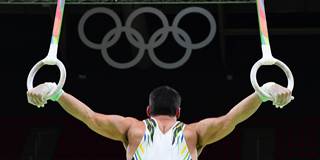There was a time when the Olympic Movement was viewed as an almost perfect reflection of a shining ideal: a global commons and a global common good. But the International Olympic Committee’s stunning fall from grace is hardly unique: governments of all types are held in low esteem nowadays.
As happens every four years, the world is transfixed by the Summer Olympic Games. Yet even the brilliance of Usain Bolt, Simone Biles, Wayde van Niekerk, Katie Ledecky, and so many others has not obscured the dirty underside of the Olympic Movement – the self-serving governance of the International Olympic Committee.
Lucy Marcus of IE Business School gets straight to the point: “Thanks to the IOC,” she says, the Olympics now “embodies some of the most prominent problems the world is facing today, from inequality to exploitation to sheer hypocrisy among our leaders.” The IOC disregards the athletes’ interests, to the point that it permitted the Russian team to compete in Rio de Janeiro, despite recent revelations about Russia’s official doping program and the World Anti-Doping Agency’s recommendation that the team be banned. Likewise, it is “indifferent to how host cities and countries” fare, particularly the vast debts that pile up in hosting the Games.
Tokyo’s new governor, Yuriko Koike, is already concerned that the 2020 Summer Games in her city may “hobble future generations with debt,” not to mention “white-elephant structures that served a single purpose in 2020, only to mar the skyline for years and decades after.” But no one should be surprised by the IOC’s disregard for its stakeholders. After all, says Smith College economist Andrew Zimbalist, the IOC is “an unregulated global monopoly” with arbitrary, self-interested decision-making practically programmed into its organizational DNA.

As happens every four years, the world is transfixed by the Summer Olympic Games. Yet even the brilliance of Usain Bolt, Simone Biles, Wayde van Niekerk, Katie Ledecky, and so many others has not obscured the dirty underside of the Olympic Movement – the self-serving governance of the International Olympic Committee.
Lucy Marcus of IE Business School gets straight to the point: “Thanks to the IOC,” she says, the Olympics now “embodies some of the most prominent problems the world is facing today, from inequality to exploitation to sheer hypocrisy among our leaders.” The IOC disregards the athletes’ interests, to the point that it permitted the Russian team to compete in Rio de Janeiro, despite recent revelations about Russia’s official doping program and the World Anti-Doping Agency’s recommendation that the team be banned. Likewise, it is “indifferent to how host cities and countries” fare, particularly the vast debts that pile up in hosting the Games.
Tokyo’s new governor, Yuriko Koike, is already concerned that the 2020 Summer Games in her city may “hobble future generations with debt,” not to mention “white-elephant structures that served a single purpose in 2020, only to mar the skyline for years and decades after.” But no one should be surprised by the IOC’s disregard for its stakeholders. After all, says Smith College economist Andrew Zimbalist, the IOC is “an unregulated global monopoly” with arbitrary, self-interested decision-making practically programmed into its organizational DNA.